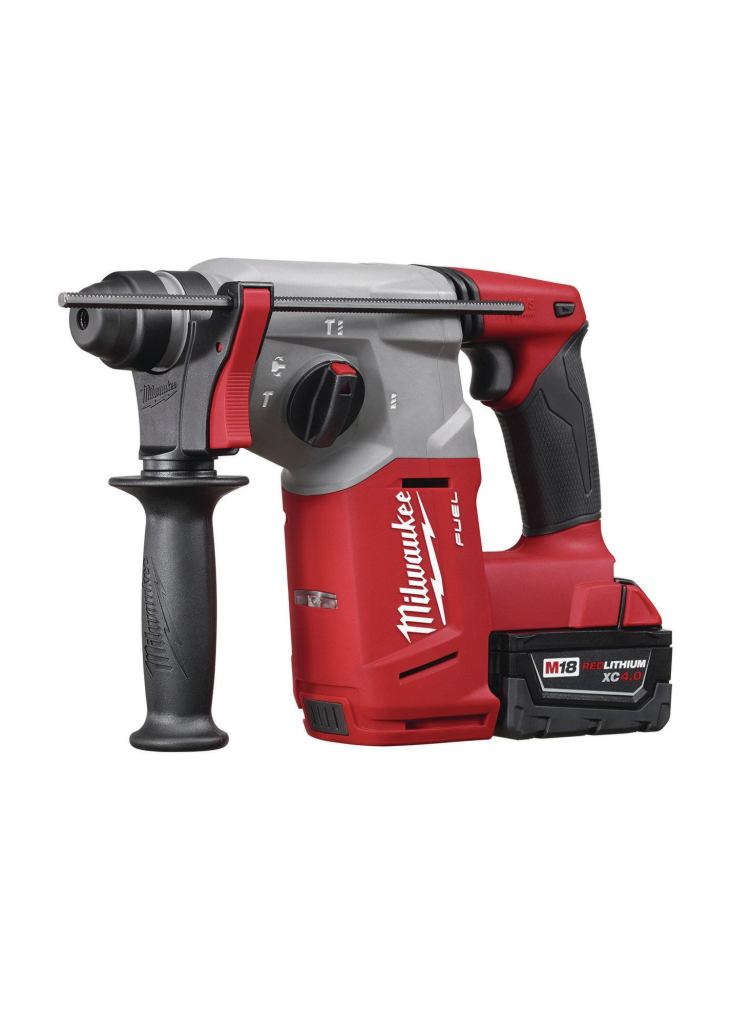2712 Specs
Motor type: brushless
Weight with battery: 8.5 pounds
Modes: rotary-hammer, rotary-only, hammer-only
Rpm: 0 to 1,400
Impact energy: 1.7 foot-pounds
Blows per minute: 0 to 4,900
Maximum spiral-bit capacity in concrete: 1 inch
Optimal spiral-bit capacity in concrete: 5/8 inch
Maximum thin-wall-core-bit capacity in concrete: 2 1/2 inches
Price: $300 for 2712-20 bare tool, $500 for 2712-22 kit, $600 for 2712-22DE kit with dust extractor
Warranty: 5 years tool, 3 years batteries
We’ve been doing seismic retrofits on northern California homes, where anchoring a sill to a foundation often requires us to squeeze into a crawlspace to drill a bunch of holes in concrete to accommodate anchors or epoxied threaded rods. We usually use a corded Bosch 1-inch SDS Plus Bulldog Xtreme rotary hammer for these holes, but dragging a cord can be a hassle when you’re working on your hands and knees.
When JLC asked us to try Milwaukee’s new M18 Fuel 18-volt 1-inch SDS Plus rotary hammer, we were starting a new retrofit and were curious to see if the tool could drill the holes as quickly as our corded Bosch while delivering ample runtime per charge.
FEATURES AND PERFORMANCE
Like Milwaukee’s other M18 Fuel tools, the new rotary hammer can be powered by any M18 battery, has an efficient brushless motor, and has protective electronics. The 4-amp-hour batteries included in the 2712-22 kit we tried have built-in fuel gauges and take almost 1 1/2 hours to fully recharge. Other features include rotary-only and hammer-only modes, anti-vibe components, an LED headlight with a 10-second afterglow, and a depth gauge with a convenient release button.
Although 1-inch rotary hammers can drill 1-inch-diameter bits through concrete, they don’t have the power to do it quickly. According to Milwaukee, to estimate the optimal capacity of a rotary hammer, divide the maximum capacity in half and add 1/8 inch; by that formula, we expected Milwaukee’s new one-incher to easily handle 1/2-inch and 5/8-inch anchor holes. We weren’t disappointed. According to Milwaukee, the M18 Fuel can drill fifty 1/2-inch-by-2 1/2-inch holes in concrete per charge under optimal test conditions. It’s impossible to get consistent test results when you’re squatting or kneeling, but for the record, we drilled nineteen 1/2-inch-by-4 1/2-inch holes on the first battery charge, and in one timed trial it took 33 to 52 seconds to drill each hole. To compare, we timed our corded Bosch Bulldog Xtreme, which took 30 to 45 seconds longer per hole.
We also used the M18 Fuel to drill ten 5/8-inch-by-7-inch holes in the same crawlspace. The tool had plenty of power to handle this more demanding application, but drilled only seven and a half holes before we had to swap batteries. During our trials, the M18 Fuel got warm, but it never got hot.
THE BOTTOM LINE
The M18 Fuel rotary hammer easily drilled our 1/2-inch and 5/8-inch holes in concrete, and in one timed trial, exceeded the speed of our corded 1-inch Bosch rotary hammer. We will definitely add one to our tool arsenal for doing seismic retrofits and other jobs. As with many of the latest cordless tools designed to compete with corded models, though, battery runtime can be an issue for the most demanding applications. For those, we will still use our corded Bosch.
Sim Ayers owns SBE Builders, in Discovery Bay, Calif.
